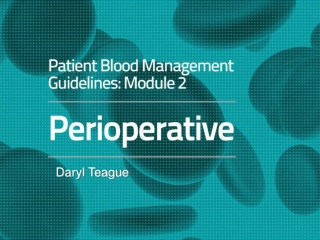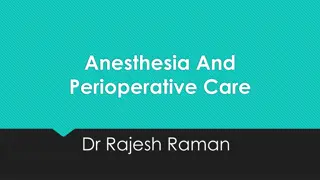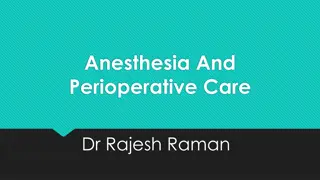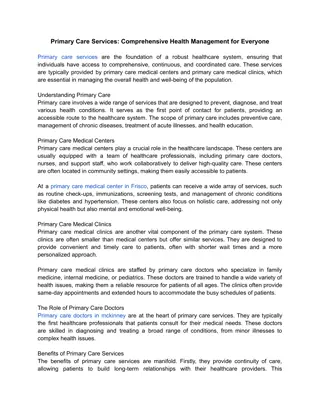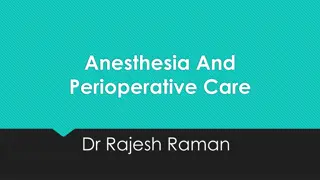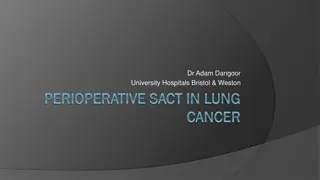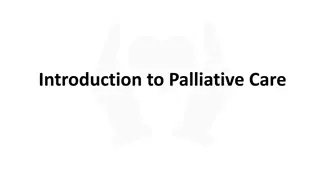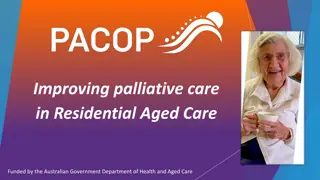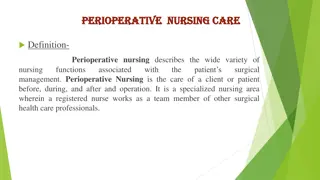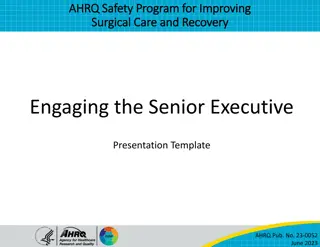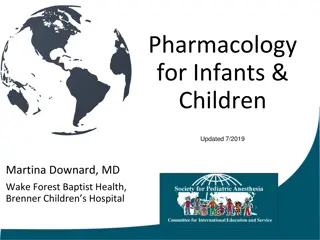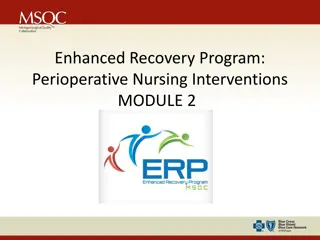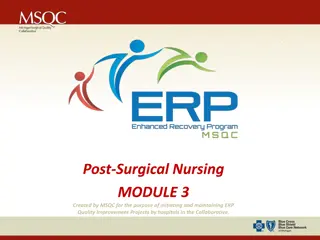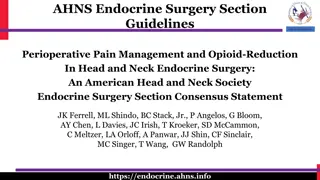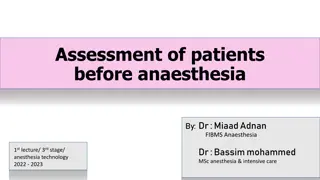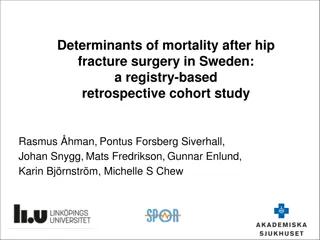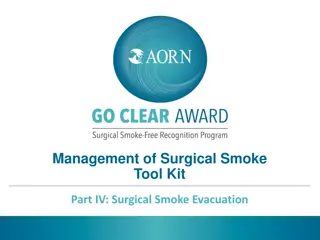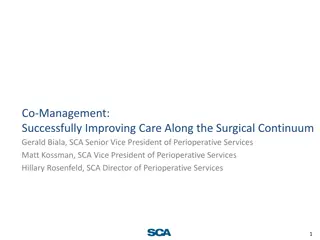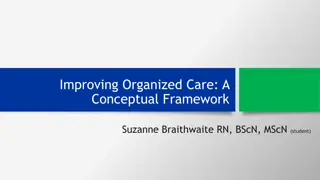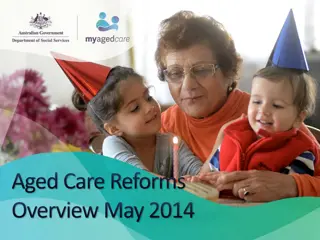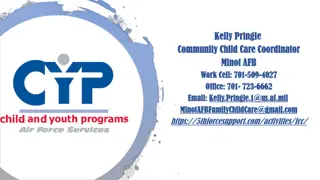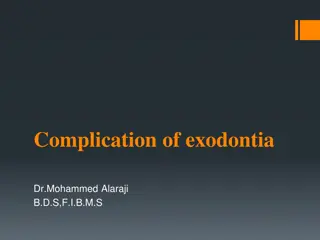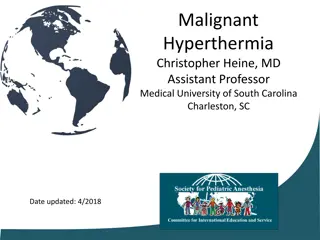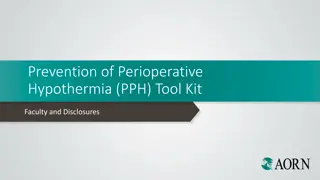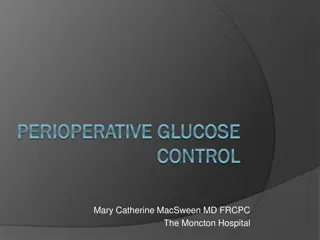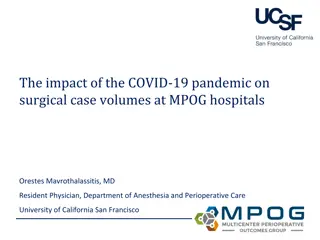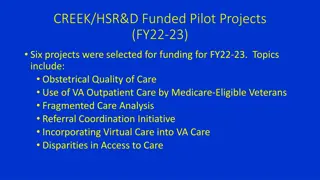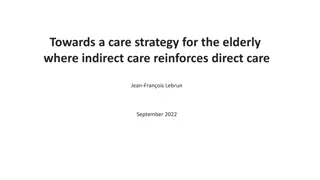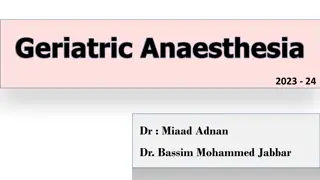Perioperative Patient Blood Management
The Patient Blood Management (PBM) Program implemented by Orthopaedic Surgeon Daryl Teague to provide optimal care for Ruby, a 73-year-old with diabetes and high blood pressure, who needs a new hip joint. The program includes preoperative anemia assessment, intraoperative blood conservation, and pos
2 views • 20 slides
Anesthesia and Perioperative Care - Comprehensive Guide by Dr. Rajesh Raman
This detailed guide by Dr. Rajesh Raman covers various aspects of anesthesia and perioperative care, including preoperative assessment and optimization, intraoperative care, postoperative care, perioperative risk assessment, risk due to surgery, medication management, and routine investigations for
2 views • 31 slides
Quick MD Care_ Your Trusted Partner in Primary Care Medicine
Quick MD Care: Your Trusted Partner in Primary Care Medicine\n\nWelcome to Quick MD Care, where compassionate primary care meets convenience. We understand the importance of having a trusted partner in managing your health. Our team of dedicated primary care doctors is committed to providing persona
5 views • 2 slides
Understanding Fluid Therapy in Veterinary Medicine
In the nineteenth century, fluid therapy was limited to severely ill patients, but now both veterinary and human medicine utilize intravenous fluid therapy extensively. Dehydration can have serious consequences, and isotonic replacement fluids are essential based on estimated dehydration, maintenanc
1 views • 20 slides
Anesthesia And Perioperative Care
This detailed guide covers key aspects of anesthesia and perioperative care, emphasizing preoperative assessment, optimization, intraoperative management, and postoperative care. Topics include perioperative risk assessment, risk scoring, routine investigations, and medication management strategies
1 views • 31 slides
Primary Care Services: Comprehensive Health Management for Everyone
Primary Care Services: Comprehensive Health Management for Everyone\n\nPrimary care services are the foundation of a robust healthcare system, ensuring that individuals have access to comprehensive, continuous, and coordinated care. These services are typically provided by primary care medical cente
2 views • 2 slides
Anesthesia and Perioperative Care by Dr. Rajesh Raman
This informative content covers various aspects of anesthesia and perioperative care including preoperative assessment, optimization, intraoperative and postoperative care, perioperative risk assessment, risk due to surgery, risk scores for major cardiac events, routine investigations for patients,
0 views • 31 slides
Advances in Perioperative Treatment of Lung Cancer: A Comprehensive Review
Explore the evolution of perioperative treatment for lung cancer from historical perspectives to current advancements. Learn about the efficacy of different chemotherapy agents, immunotherapies, and adjuvant treatments, along with the impact on patient outcomes and resectability criteria. Discover t
1 views • 19 slides
Understanding Palliative Care: Enhancing Quality of Life in Serious Illness
Palliative care is a holistic approach focused on improving the quality of life for patients and their families dealing with life-threatening illnesses. It involves early identification, assessment, and treatment of pain and other physical, emotional, and spiritual issues. This comprehensive trainin
0 views • 60 slides
Child Care and Youth Programs at Minot AFB
Offering a range of child care services including Child Development Center for ages 6 weeks to 5 years, School Age Care for Kindergarten to 12 years, Family Child Care Program, and Youth Programs for ages 9-18. Services include full-time care, before/after school care, extended duty care, emergency
1 views • 6 slides
Enhancing Palliative Care in Australian Residential Aged Care
PACOP, funded by the Australian Government Department of Health and Aged Care, is a program focused on improving palliative care in residential aged care facilities. It involves standardized assessment practices, early identification of care needs, and a collaborative model for sustainable support.
0 views • 10 slides
Essential Aspects of Perioperative Nursing Care
Perioperative nursing involves comprehensive care for patients before, during, and after surgery. It encompasses various phases such as preoperative, intraoperative, and postoperative care, with a focus on ensuring the patient's well-being and safety throughout the surgical process. Key goals includ
0 views • 33 slides
Engaging Senior Executives in Improving Surgical Care and Recovery Program
This presentation template aims to engage senior leaders in bridging the gap between management and frontline providers for implementing an Improving Surgical Care and Recovery program successfully. It emphasizes the importance of senior leader participation and provides a structured outline for cus
0 views • 15 slides
Pediatric Pharmacology Update: Perioperative Medications in Infants and Children
Gain insights on frequently used medications in the perioperative period for infants and children, including anesthesia medications. Explore pharmacokinetics, drug distribution in neonates, and the effects of common anesthesia agents on pediatric patients. Understand how immature kidney or liver fun
0 views • 43 slides
Priorities and Quality Measures for Type 2 Diabetes Care in NHS GGC
Dr. Kashif Ali leads primary care for Type 2 diabetes, while Dr. James Boyle oversees secondary care in NHS GGC. The data from December 2018 shows the number of Type 2 diabetes patients, their care processes, HbA1c levels, and BMI status. The Diabetes Quality Improvement and Outcome Measures aim to
0 views • 27 slides
Enhanced Recovery Program: Nursing Interventions and Benefits
This module focuses on the Enhanced Recovery Program in perioperative nursing, emphasizing the importance of maximizing healthcare efficiency through evidence-based practices. It highlights the benefits of ERP, including improved patient outcomes, satisfaction, and cost savings. The essentials for s
0 views • 22 slides
Enhanced Recovery Program Implementation in Post-Surgical Nursing
Introducing and implementing an Enhanced Recovery Program (ERP) in post-surgical nursing can significantly improve patient outcomes, experience, and satisfaction. This clinical pathway designed by MSQC aims to optimize patient recovery by standardizing protocols throughout the perioperative care pro
1 views • 26 slides
Child Care Challenges in Kentucky: The Child Care Cliff
Explore the landscape of child care in Kentucky, revealing the challenges families face with the Child Care Cliff. Discover statistics on child care centers, family child care homes, and the average cost of child care in Kentucky. Understand the importance of the Child Care Assistance Program (CCAP)
0 views • 18 slides
Anesthesiology Lecture Series: Comprehensive Overview by Dr. Jumana Baaj
Delve into the realm of anesthesiology with Dr. Jumana Baaj's comprehensive lecture series covering the role of an anesthetist in preoperative care, NCEPOD classifications, perioperative patient journey, general anesthesia techniques, and airway management. Learn about patient assessment, anesthetic
0 views • 35 slides
AHNS Endocrine Surgery Section Guidelines: Perioperative Pain Management and Opioid Reduction
The American Head and Neck Society Endocrine Surgery Section provides consensus statements on perioperative pain management and opioid reduction in head and neck endocrine surgery. Addressing the opioid addiction crisis, the expert panel offers guidelines on pain management strategies, opioid prescr
0 views • 18 slides
Perioperative Fluid Therapy: Key Concepts and Considerations
Understanding perioperative fluid therapy is crucial for maintaining normovolemia, achieving hemodynamic stability, and preventing complications. Factors such as total body water variation, fluid resuscitation goals, desirable outcomes, and fluid and electrolyte regulation play a critical role in en
3 views • 56 slides
Preoperative Assessment of Patients for Anesthesia: Guidelines and Protocols
Efficient preoperative assessment is crucial to ensure patient safety and optimal outcomes during anesthesia administration. This process involves thorough history taking, physical examination, evaluation of medical conditions, and planning for anesthesia techniques. The assessment helps in identify
0 views • 46 slides
Determinants of Mortality After Hip Fracture Surgery in Sweden: A Registry-Based Retrospective Cohort Study
Hip fractures in Sweden pose significant challenges due to increased mortality rates. A retrospective cohort study analyzed data from the Swedish PeriOperative Registry to identify factors influencing patient outcomes post-surgery, highlighting the importance of various perioperative variables on lo
0 views • 32 slides
Comprehensive Guide to Surgical Smoke Evacuation in the Perioperative Setting
This detailed guide covers the essential aspects of surgical smoke evacuation in the perioperative setting. It includes information on smoke evacuator systems, evaluating smoke evacuators, critical features to consider, smoke capture methods, triple filter system, and the use of wall suction with in
0 views • 20 slides
Enhancing Surgical Care Through Co-Management Strategies
Explore the benefits of co-management agreements in improving surgical care along the continuum. Learn about critical success factors, physician engagement, and shared decision-making strategies for achieving positive outcomes in perioperative programs.
0 views • 28 slides
Understanding Organized Care in Primary Care Settings
Organized Care refers to a natural community of caregivers with a shared commitment to proactive population and individual care management. Through effective and efficient practices, it serves the needs of patients across various settings and over time, with aligned goals and provider accountability
0 views • 18 slides
Overview of Aged Care Reforms in May 2014
Aged Care Reforms in May 2014 introduced significant changes to the aged care sector in Australia. The reforms aimed at providing quality care for older Australians, reducing red tape, and enhancing services such as Home Care Packages, MyAgedCare, and the Australian Aged Care Quality Agency. Changes
0 views • 45 slides
Antibiotic Prophylaxis in Perioperative Care
Explore the rational approach to perioperative antibiotic use, the importance of antibiotic stewardship in the operating room, and guidelines for selecting and administering antibiotics to prevent surgical site infections. Understand when antibiotic prophylaxis is necessary, which antibiotics to use
0 views • 44 slides
Minot Air Force Base Family Child Care Programs
Offering a variety of child care services including Child Development Center (CDC) for infants to 5 years old, School Age Care (SAC) for Kindergarten to 12 years, Youth Programs for ages 9-18, and Family Child Care Program (FCC) for infants to 12 years. Additional programs include Extended Duty Care
0 views • 6 slides
Common Complications of Exodontia in Dental Practice
Undesirable situations can arise during dental exodontia, including perioperative and postoperative complications. Perioperative complications may include crown fractures, soft tissue injuries, and failure to obtain anesthesia, while postoperative complications can involve trismus, hematoma, and wou
0 views • 48 slides
Understanding Malignant Hyperthermia: Causes, Management, and Epidemiology
Malignant Hyperthermia (MH) is a genetic disorder of skeletal muscle triggered by certain anesthetics, leading to a hyper-metabolic state. The uncontrolled release of calcium results in muscle rigidity, metabolic acidosis, hyperthermia, and other serious complications. MH was first described in the
0 views • 24 slides
Impacts of Marketisation on Home Care for Older People in Urban China
This study by Wenjing Zhang from the University of Bristol delves into the effects of the marketisation process on home care for the elderly in urban China. It explores the rationale behind the marketisation of care, the trends in home care marketisation, and the processes involved. The background s
0 views • 19 slides
Prevention of Perioperative Hypothermia (PPH) Tool Kit Faculty and Disclosures
AORN collaborates with Victoria Steelman, PhD, RN, CNOR, FAAN, and The University of Iowa to offer the Prevention of Perioperative Hypothermia (PPH) Tool Kit, funded by the Agency for Healthcare Research and Quality. The kit features expert faculty members, including Susan K. Bakewell, Ellice Mellin
0 views • 4 slides
Perioperative Anticoagulation in Atrial Fibrillation Patients
A thorough exploration of perioperative bridging anticoagulation in patients with atrial fibrillation, discussing the benefits of anticoagulation, therapeutic options, comparison of literature, and application in moderate-risk patients. The use of warfarin in atrial fibrillation treatment, standard
0 views • 39 slides
Perioperative Glucose Control in Diabetes Management
Managing perioperative glucose levels is crucial for patients with diabetes to prevent complications and improve outcomes. This case-based scenario discusses strategies for perioperative glucose control in different diabetic patients, emphasizing the importance of monitoring and individualized treat
0 views • 47 slides
Impact of COVID-19 Pandemic on Surgical Case Volumes at MPOG Hospitals
The study examines the impact of the COVID-19 pandemic on surgical case volumes at 33 MPOG academic/private centers from January 2019 to May 2020. With disruptions in routine hospital operations and significant changes in perioperative patient care due to the pandemic, the research explores trends i
0 views • 13 slides
VA Healthcare Pilot Projects FY22-23
Six VA-funded pilot projects for FY22-23 focus on improving obstetrical quality of care, outpatient care utilization by Medicare-eligible veterans, fragmented care analysis, referral coordination, virtual care integration, and addressing disparities in access to care. Projects include assessing obst
0 views • 7 slides
Enhancing Elderly Care: Direct and Indirect Support Strategies
Implementing a care strategy for the elderly involves integrating both direct, personal care activities and indirect care tasks. This approach benefits two key target audiences, including millions with varying levels of dependency and informal carers. The positive impacts of indirect care include we
0 views • 7 slides
Understanding Subacute Care: Types of Residents and Care Settings
Subacute care involves providing specialized care for individuals who require more attention than what typical long-term care facilities can offer. This level of care is provided in settings like hospitals or certain units within long-term care facilities. Residents in subacute care settings need a
0 views • 62 slides
Geriatric Anaesthesia: A Guide to Perioperative Care for Elderly Patients
The field of geriatric anaesthesia addresses the unique challenges faced by elderly patients undergoing surgery, including higher perioperative complication rates due to reduced functional reserve and co-morbidities. This guide emphasizes the importance of careful preoperative assessment, meticulous
0 views • 25 slides
